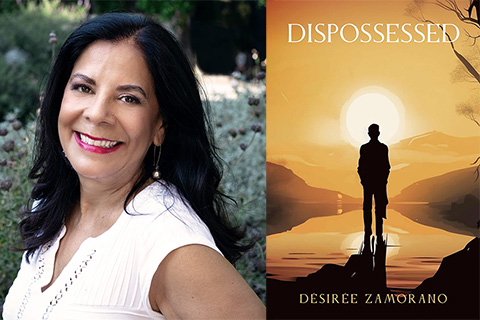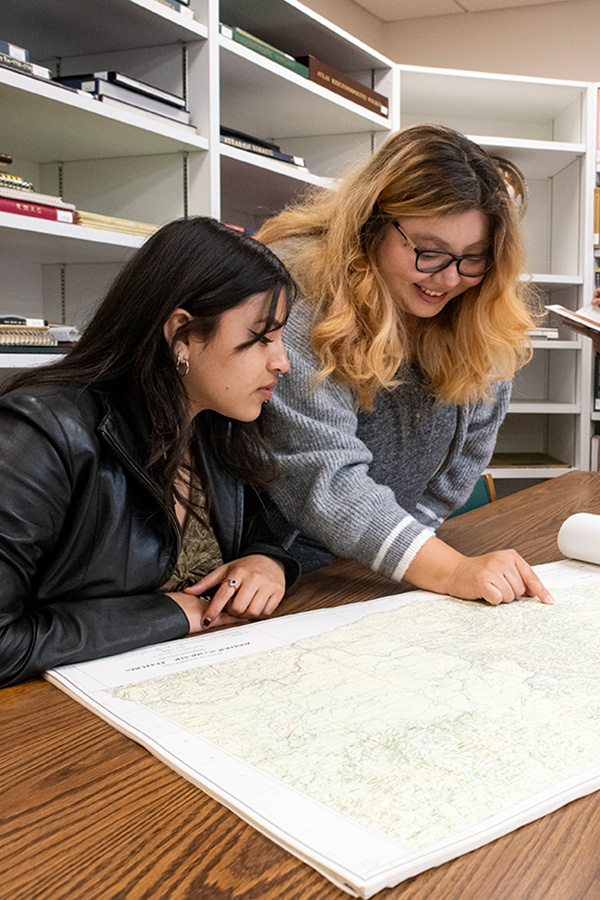Newsletter Edition: Spring 2025
Contributed by Librarians Nery Alcivar-Estrella and Lisa Cheby

On March 5, 2025, the University Library hosted Désirée Zamorano, Los Angeles novelist and educator, to talk about her latest historical fiction novel, Dispossessed. During the event, Zamorano discussed Dispossessed’s position at the intersection of the ethnic studies and education fields. Her role as an educator at California State University Long Beach, teaching future educators about the importance of teaching the hidden histories of BIPOC communities, motivated her to write this particular story, which takes place during the mass expulsion of Mexican Nationals and Mexican-Americans from the United States in the 1930’s. She asked herself, “Where is the writer who's going to talk about this? Where's the great American novelist who's going to tackle this?” Zamorano rose to the challenge and decided that she would be the novelist to depict this history in a vivid and accessible way. By following the life of Manuel, separated from his family at age four, we learn the hidden histories of Mexican-Americans in Los Angeles and the reality of generational trauma inflicted on these communities by unjust laws and policies that we see being called back by our current national leaders. Zamorano conducted a powerful reading of the first chapter of Dispossessed, depicting the heartbreaking experience of family separation.
The novel is steeped in Zamorano’s own research and experiences. Zamorano’s writing is influenced by research and texts she uses in her instruction that emphasize the necessity of diversity and inclusion in pedagogy. Although currently "DEI has a target on its back,” Zamorano continues to ask her students and readers, “What is wrong with diversity, equity, and inclusion?” After all, this is what she and others in the CSU system teach: “how to bring kids into the classroom, how to make them feel welcome.” Zamorano shared with the audience, as she does with students, the power of primary sources like Dorothea Lang’s photo of a Mexican-American family caught up in the mass “repatriation” in the 1930’s. As she journeyed through her own research, Zamorano widened the scope of her novel to include the history of the decimation of the community in Chavez Ravine and stories she heard visiting detainees in the private ICE detention centers in Adelanto, California.
This mixture of history and fiction is not new for Zamorano, who spoke about how for her, writing is activism. “Everything I write is about my demographic. I'm a Mexican-American and I was really upset and I continue to be upset by the limited portrayals in the media of Latinas,” stated Zamorano. Her debut novel, The Amado Women, about middle-class Mexican-American women “connected by birth, separated by secrets,” is being rereleased by Lee and Low Books in August 2025. Her first novel, Human Cargo, features a Latina private investigator who breaks the mold of stereotypical Latina characters while exposing human trafficking in Los Angeles. More recently, between finishing The Amado Women and while working on completing and selling Dispossessed, Zamorano wrote a series of short stories that explored retelling and recreating fairy tales, from a Mexican-American perspective. Now a collection, Amarisa’s Cooking Pot: Life in All Its Wonders, will be published in 2026 by the University of Nevada Press.
During the Q&A, audience members and the Zoom attendees connected Dispossessed to the contemporary moment as Latin American immigrants and mixed-status families continue to face similar trials and tribulations. She offered valuable encouragement to educators, students, and community members to make hidden histories visible and become more involved in grassroots activism.
This event, part of the Library’s Women’s History Month events, was organized by Nery Alcivar-Estrella, Ethnic Studies Librarian, with the support of the University Library and co-sponsored by Lisa Cheby, Education Librarian, with the help of the Dr. Karin J. Duran and Richard Nupoll Endowment.
Dispossessed will be available for purchase at the CSUN Campus Store throughout March and early April. Get your own copy soon!

